Global Affairs
India's Commitment to Global Security
An overview of FATF Reports
Posted On:
16 JUL 2025 12:23PM
Key Takeaways
- The Financial Action Task Force (FATF) was set up in 1989 during the G7 Summit in Paris.
- India became 34th member of FATF in 2010.
- India has declared zero tolerance towards terror financing and money laundering, working actively with FATF.
- India has implemented risk-based legislative frameworks under the Prevention of Money Laundering Act 2002 and the Unlawful Activities (Prevention) Act 1967.
- The two recent reports of FATF in June 2025 provide significant overview of evolving global threats and typologies while offering practical recommendations and mitigation strategies
|
Introduction
As the world becomes more digital, the way money moves is changing. While this brings many benefits, it also creates new risks. Money can be misused to support terrorism, hide illegal earnings, or fund activities that can harm global peace. To protect the world’s financial systems, the Financial Action Task Force (FATF) works with countries around the globe. The Financial Action Task Force (FATF) is an independent inter-governmental body tasked with setting global standards against money laundering, terrorist financing, and proliferation financing.
FATF Establishment
Established in 1989 during the G7 Summit in Paris, the Financial Action Task Force (FATF) sets international standards that enable national authorities to effectively track and act against illicit funds linked to drug trafficking, the illicit arms trade, cyber fraud, and other serious crimes. This 40-member body has led to more than 200 countries and jurisdictions committing to implement FATF’s Standards, forming a co-ordinated global response to prevent organised crime, corruption, and terrorism.
FATF: Safeguarding the Global Financial System
The FATF identifies jurisdictions with weak measures for anti-money laundering and counter-terrorist financing (AML/CFT) in two FATF public documents that are issued three times a year.
- Grey List: This list includes countries that are actively working with the FATF to address strategic deficiencies in their regimes to counter money laundering, terrorist financing, and proliferation financing. Being placed under Increased monitoring means the country has committed to resolve swiftly the identified strategic deficiencies within agreed timeframes Jurisdictions under Increased Monitoring. As on June 13, 2025 countries placed in this list are Algeria, Angola, Bolivia, Bulgaria, Burkina Faso, Cameroon, Côte d'Ivoire, Democratic Republic of Congo, Haiti, Kenya, Lao People's Democratic Republic, Lebanon, Monaco, Mozambique, Namibia, Nepal, Nigeria, South Africa, South Sudan, Syria, Venezuela, Vietnam, Virgin Islands (UK), Yemen.
- Blacklist: This identifies countries or jurisdictions with serious strategic deficiencies to counter money laundering, terrorist financing, and financing of proliferation and calls for application of enhanced due diligence and counter measures. In the current list jurisdictions subject to a Call for Action include Democratic People's Republic of Korea, Iran & Myanmar, as on June 13, 2025.
As of February 2025, out of the 139 countries reviewed by FATF, 86 have since made the necessary reforms to address their AML/CFT weaknesses.
India in FATF: Securing Finances, Stopping Crimes
India joined the Financial Action Task Force (FATF) in June 2010 as its’s 34th member. As a part of its Membership, a joint FATF / Asia Pacific Group Mutual Evaluation Team visited India in November-December, 2009 for on-site assessment of India’s compliance with the 40+9 Recommendations of FATF. On 25th June 2010, India was admitted as 34th Country Member of FATF. Earlier, India had become Observer at FATF in the year 2006.
Financial Action Task Force (FATF) Major Reports
Continuing with its efforts in effective global action to counter the threats of the abuse of the financial systems, in June-July 2025, the Financial Action Task Force (FATF) released two key reports:
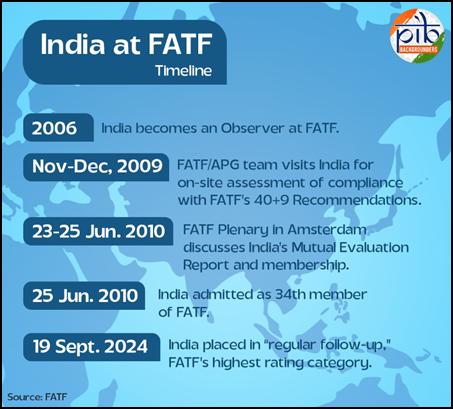
These reports provide a significant overview of evolving global threats and typologies while offering practical recommendations and mitigation strategies for financial institutions, law enforcement authorities, and financial intelligence units worldwide.
- Salient Features of the Report on Proliferation Financing and Sanctions Evasion
The FATF’s report on “Complex Proliferation Financing and Sanctions Evasion Schemes” outlines increasingly sophisticated methods employed by states and non-state actors to finance the proliferation of weapons of mass destruction (WMD). It highlights many evolving strategies for circumventing global sanctions designed to prevent proliferation financing.
Evolving Threats and Tactics:
The report extensively covers advanced methods including the manipulation of beneficial ownership information to mask the identities of sanctioned individuals and entities, the misuse of virtual assets and cryptocurrencies, and leveraging maritime sectors and shipping industries to bypass international regulations.
Challenges and Good Practices:
- Highlights challenges and good practices for detection of Proliferation financing (PF) and sanctions evasion
- Emphasises upon domestic coordination and collaboration.
- Stresses the need for strong international cooperation.
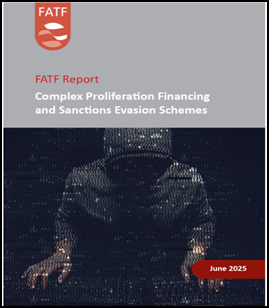
In this report, FATF highlights India’s practice of establishing multiple operational and policy coordination mechanisms on Proliferation financing (PF).
Role of DPRK and Pakistan:
- DPRK’s cyber operations, including the notorious $1.5 billion cyber-theft from ByBit in 2025, highlight the nexus between cybercrime and proliferation financing.
- A case study contributed by India highlights the proliferation concerns for the South Asian region arising from the state-owned National Development Complex in Pakistan, which is sanctioned in multiple jurisdictions on proliferation financing concerns.
- Pakistan remains a high-risk jurisdiction in the region for proliferation financing.
Challenges in Global Enforcement
- Only 16% of assessed countries have demonstrated high/substantial effectiveness in Immediate Outcome (IO)11, which remains a critical gap in international compliance.
FATF recognizes India as one of the few countries which has demonstrated substantial level of effectiveness in IO 11 in its assessment.
Risk Indicators and Mitigation Strategies
- Stronger international cooperation, improved suspicious transaction reporting (STRs), and enhanced information-sharing protocols between public and private entities.
- Periodic updates on risk understanding and standardized definitions to enhance cross-jurisdictional collaboration.
- Salient Features of the Report on Terrorist Financing Risks
This comprehensive update provides in-depth insights into terrorist financing (TF) methods and emerging risks, including the increasing involvement of state-sponsored terrorism.
Terrorist Financing Landscape in 2025:
- The report delineates how terrorist groups are adopting sophisticated financial structures and decentralized networks. This shift enables small cells and individuals to operate locally, creating fragmented ecosystems that complicate detection and enforcement.
- Highlights trend of regional and geographic decentralization with financing increasingly conducted by local actors in fragmented ecosystems, complicating detection and enforcement.
State-Sponsored Terrorism:
- FATF acknowledges state sponsorship of terrorism as a longstanding TF threat to global peace and security, as well as to the stability of regional financial and political systems.
- State sponsorship includes direct funding, logistics, materials, or training.
India, in its National Risk Assessment for Money Laundering and Terrorist Financing (NRA) 2022, has identified Pakistan’s state sponsorship of terrorism as a high-risk Terror Financing (TF) source.
Traditional Methods:
- Report indicates that traditional methods remain widely used, including cash smuggling, hawala, and abuse of NPOs.
- Traditional and new methods are increasingly blended.
- Hawala networks also use now crypto to settle balances.
- Online crowdfunding is increasingly common to fundraise for terrorist campaigns under the guise of charitable initiatives.
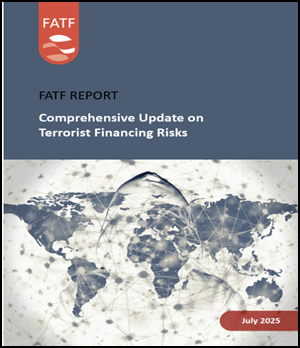
Use of Virtual Assets, Social Media and E-commerce Platforms:
- The report identifies significant reliance by terrorist groups on informal financial mechanisms such as e-commerce platforms, mobile money platforms, and cryptocurrencies.
- The increasing misuse of social media platforms for crowdfunding and recruitment further exacerbates these challenges, providing anonymity and ease of financial transactions outside traditional banking frameworks.
- The report has a case study on the use of e-commerce platform in the procurement of materials for a terrorist attack in India.
Criminal Nexus and Microfinancing of Lone Actors:
- The report details the growing convergence between terrorist financing and organized crime activities.
- Terrorist organizations increasingly leverage illicit proceeds from activities such as human trafficking, drug smuggling, kidnapping for ransom, and extortion.
- Detection of emerging microfinancing models utilized by lone actors, often through small, legitimate sources of income, difficult for financial institutions and law enforcement authorities.
- The report also features a case study by India on use of online payment service and VPNs to fund lone actor terrorist act.
Gaming Platforms:
- Gaming and gaming-adjacent platforms are also used to generate income from streaming, game sales, and donations – offering both financial and recruitment opportunities.
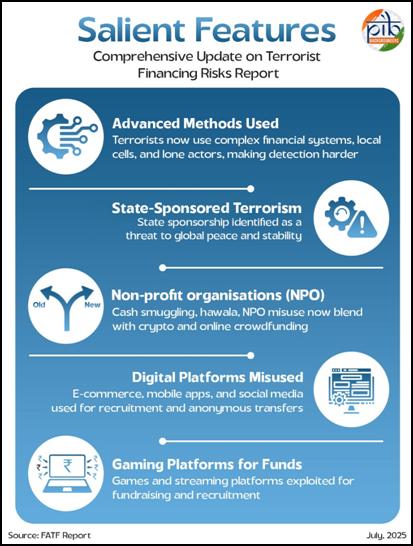
The report acknowledges the need for stronger controls over the sector via amendments to FATF standards.
Social Media:
- Social media and encrypted messaging apps continue to be a regulatory gap and are used to promote donation campaigns and share payment instructions, including wallet addresses.
Challenges and Policy Recommendations:
- The FATF report identifies implementation challenges, including ineffective investigations, insufficient cross-border cooperation, and inadequate use of financial intelligence.
- Recommendations encompass strengthening regulatory frameworks for emerging sectors such as virtual assets and social media platforms.
- The report also recommends improving regional cooperation, enhancing public-private partnerships, and integrating comprehensive risk assessments into national policy frameworks.
- Highlights need for continued monitoring of monitor both traditional and new methods to ensure the regulatory response keeps pace.
Conclusion
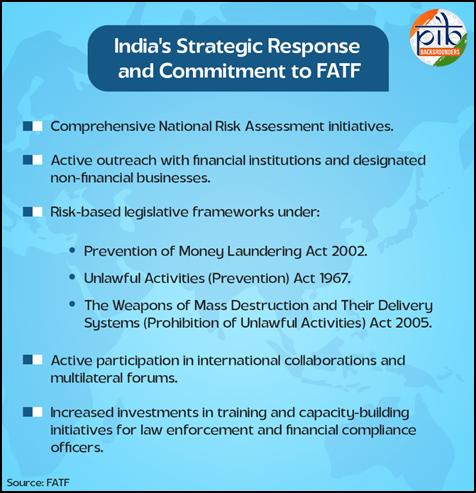
India remains firmly committed to strengthening its AML/CFT frameworks. As a responsible member of the FATF, India is recognizing its crucial role in enhancing domestic capabilities against financial crimes linked to proliferation and terrorism financing and contributing in upholding the integrity of the global financial system.
References:-
FATF
Ministry of Finance
Download in PDF
***
RT | M
(Explainer ID: 154898)
आगंतुक पटल : 7621
Provide suggestions / comments